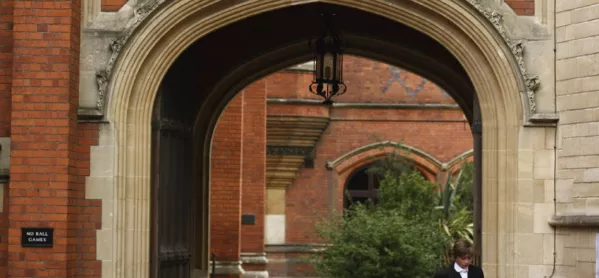Six things we learned about private schools at this year’s HMC conference

Leaders of the country’s most prestigious independent schools gathered this week for the annual meeting of the Headmasters’ and Headmistresses’ Conference (HMC). So what did the event reveal about elite private schools and the way their headteachers think?
1) It’s not like the state sector
This is the second time in recent years that HMC headteachers have picked St Andrews for their gathering and - perhaps unsurprisingly - the programme began with a morning of golf at the world-famous Fairmont course. Headteachers were treated to a black tie dinner on the second evening of the conference, and a firework display as a grand finale. You certainly don’t get that at the NUT’s annual conference.
2) HMC headteachers are big fans of the ‘growth mindset’ theory
Even in schools often viewed as the country’s most traditional educational institutions, heads are swotting up on Carol Dweck. Her theory - that people are more likely to succeed if they believe that persistence and an ability to learn from their mistakes are more important than natural talent or lack of it - is taking the sector by storm.
Headteachers filled the main conference hall for a talk by Matthew Syed, the three-time Commonwealth table tennis champion, whose animated explanation of the “growth mindset” captivated the audience and provoked a flurry of questions about how the theory can be most effectively deployed in schools.
Some are already using it - but not always to great effect. One headteacher told how her teenage daughter had developed a sarcastic new response to her encouraging parents: “Yeah, mum, that’s really growth mindset of you.”
3) They feel a sense of ‘moral purpose’
Top private schools are convinced they can be a force for good. Ed Elliott, head of the Perse School in Cambridge, told the conference: “The moral purpose of HMC is to make education better for all.”
4) They’re worried about exam marking
Improving the exam system for the benefit of all schools, state and private, is a big part of fulfilling this “moral purpose”. Headteachers believe the fact that 77,000 grades are changed each year as a result of appeals is undermining confidence in the system.
The exams watchdog Ofqual argues this represents a very small proportion of overall grades, but Chris King, chair of the HMC, has a strong riposte: “Tell that to the 77,000 young people who get the wrong grade.”
HMC schools believe their independence makes them well-placed to lobby Ofqual on this issue, and they did so during the conference where the watchdog’s chief Glenys Stacey was a guest.
5) They’re not scared of criticism…
Some of the week’s headlines were unflattering to HMC schools, which were criticised during the conference for their “undemocratic” approach to sports and for pushing students through an “identikit educational experience” into an “off-the-peg life”. Although this caused inevitable jitters in the PR department, journalists were told that senior HMC headteachers were, on the whole, relaxed about the coverage. They believed “challenge” to be an important part of their association’s role.
6)…But they like their privacy
Much of the discussion at the conference was held behind closed doors, with journalists not allowed to attend. Requests to attend discussions on the future of boarding schools, on how schools can improve pupils’ wellbeing and on the marking of this summer’s IGCSEs were all turned down on the grounds that sensitive information might be discussed.
Want to keep up with the latest education news and opinion? Follow TES on Twitter and like TES on Facebook
Keep reading for just £1 per month
You've reached your limit of free articles this month. Subscribe for £1 per month for three months and get:
- Unlimited access to all Tes magazine content
- Exclusive subscriber-only stories
- Award-winning email newsletters



